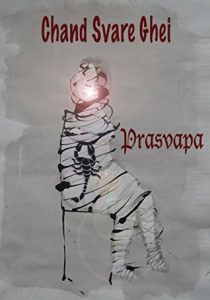★★★½
Prasvapa by Chand Svare Ghei is a dreamlike collection of short stories that’s part fantasy, part crime, part universe entirely of Ghei’s vivid imagination. A Norwegian author writing in English, Ghei has created a fantastical world that has little relation to our own, past or present. Each story is introduced with an abstract epigraph, which invites the reader to explore the story’s deeper meaning. The word “Prasvapa” is Sanskrit for “dream,” and that dreamlike quality permeates each one of these evocative and mind-bending stories.
Ghei is a highly inventive writer. Without question, you won’t find another book of short stories like this on anyone’s shelf. That alone deserves high praise. At the same time, the narrative may be playful to a fault, as it’s sometimes difficult to get a foothold in Ghei’s world, which comprises a kind of anti-realism, creative as it may be.
A frequent lament about self-published work is the author relies on telling and not showing. Ghei goes in the opposite direction: too much showing and not enough telling, so the story and its meaning is somewhat elusive. There is some poetry in vagueness, giving it a mysteriousness and otherworldliness, as people are not entirely behaving as you expect, but this does get in the way of narrative propulsion if characters motivations are so out of reach.
The book describes itself as “the limitless nature between the known and the undisclosed, the consciousness and the various states of trance and dream.” So this dreamlike quality is obviously his intention. As in a dream, the thread of the story may be difficult to understand. However, it’s more like a dream after you’ve forgotten it and are trying to remember the details, rather than the dream itself, which can have an understandable narrative flow, albeit frequently absurd.
The absurdist nature is here in spades – for instance, a protagonist named “Dave” who regales a trapped woman with tales of swords and sorcery, with no strict establishment of time or place – but it’s sometimes difficult to grasp the overall point the author is making, where dreams are loaded with symbolism. It’s said that art is up to the interpretation of the viewer, but one also needs to have some understanding of the author’s intention, or it veers too close to obscurity, rather than absurdity.
Fortunately, there are a lot of gems of language even with these problems, which will keep a reader invested. There is uncommon poetry to Ghei’s prose and when he hits the mark, he hits it and then some, and those moments are inspired and meaningful. The trouble is that these moments are buried in the book’s other faults.
However, for all these issues, Prasvapa is a book that takes chances, and there are enough stellar moments that you’ll keep reading to see what Ghei comes up with next. It’s a book with a kind of unspoken philosophy – not of ideas, but of mood, and the effect is that by the end your transported to a dreamlike place entirely of Ghei’s making. Ghei is a writer with large ambition and a singularly unique narrative voice. There is doubtlessly a lot of good work coming from him on the horizon.
Links
Author Site
YouTube
Amazon
Goodreads
Review Overview
Design
Editing
Content
Get an Editorial Review | Get Amazon Sales & Reviews | Get Edited | Get Beta Readers | Enter the SPR Book Awards | Other Marketing Services
























Leave A Comment